Beth Revis's Blog, page 31
July 30, 2012
Upcoming Short Stories and Anthologies
I just finished the copy edits for SHADES OF EARTH (at 3am last night) and you know what that means...ARCs soon! I cannot wait. I am still at the stage where it feels as if SoE might not quite be real. I sort of expect to wake up soon and find out that this was all a really vivid dream.
Anyway! While we all wait for ARCs and proof that I'm not hallucinating my whole writing career, I wanted to tell you guys about some other awesome projects I've been working on. Namely: anthologies!
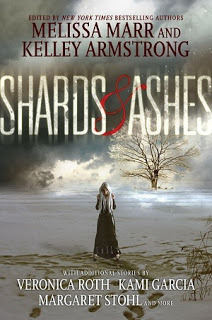
Anthology Title: SHARDS AND ASHES
Edited by: Melissa Marr and Kelley Armstrong
Release date: February 19, 2013
Add it to your GoodReads here.
About my story: This YA dystopian anthology is going to be amazing, and I can't wait to read all the other stories in it! My contribution is titled "Love is a Choice," and is all about Orion before Elder was born. It describes what happened in those first few months after Eldest tried to kill him. It explains how he became the Recorder and in charge of the Recorder Hall. And it's also about a girl, and love, and the choices we make that divide us.
It was really difficult for me to write this story because it forced me to take a closer look at Orion. When I first came up with this character, in the very first draft of the very first book, he was a mustache-twirling crazy bad guy. He had no depth, and it was way obvious what his role in the book was. As I revised and rewrote ACROSS THE UNIVERSE, though, I found that the character who changed the most was Orion.
And I really started to sympathize with him. This was not something that I expected, and as I was writing the books, I was a little startled by how much I could myself in this character. After finishing A MILLION SUNS, I knew I wanted to do a short with Orion, so I could let other readers see how much I discovered about his character.
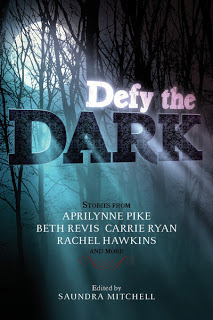 Anthology Title: DEFY THE DARK
Anthology Title: DEFY THE DARK
Edited by: Saundra Mitchell
Release date: June 2013
Add to your GoodReads here.
Official anthology website here.
A little something extra extra: The last tale in this book is being reserved for...you. If you're an unpublished author, you're going to want to check back with the antho website and look at the competition with a prize of being published in the antho (and paid for your contribution)! More information on the contest here.
About my story: The title of my story is "Night Swimming"--in the antho, each story takes place at dark. Mine is about Kayleigh and Harley and the night Kayleigh died.
But the reason why I love my story in this antho extra much is because the narrator in the story is gender ambiguous. In my mind, it could be narrated by either Bartie (the man who started the rebellion in A MILLION SUNS) or by Victria (the woman who was in the Hospital with Harley). I leave it up to the reader to decide who's narrating the story. It's about betrayal and longing, whether you should stand up and fight or bow down and survive. It's about love, too, and what happens when the person you love doesn't love you back.
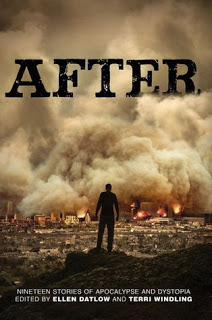
Anthology Title: AFTER
Edited by: Ellen Datlow and Terri Windling
Release date: October 2012
Add to your GoodReads here.
A little something extra extra: I'll be celebrating the release of this anthology--along with many of the other contributors--in New York at Books of Wonder! It will all go down October 11--hope to see you here! More info.
About my story: My contribution to this dystopian anthology is called "The Other Elder." It was the very first short story set on Godspeed that I wrote, and I love it extra special because of that.
But I also like it because it tells a little bit about Godspeed and how it came to be the dystopic dictatorship that Eldest controlled. "The Other Elder" describes how the society went from an Eldest who was retiring to the next Eldest, and the young Elder who was going to take over next. It explains what went wrong, and it shows the reader how Godspeed's society came to be.
Also? The narrator is a young Elder, one who thinks about fighting back, bucking the system. And because of the nature of the Eldest system, it could be the Eldest that you met in ACROSS THE UNIVERSE. It could be Orion. It could be neither of them. I leave that up to you.
As with most my stories and books, "The Other Elder" centers on a choice: whether it's worth it to give up freedom for peace.
Those are all the anthologies I've contributed to, and each story takes place in the world of ACROSS THE UNIVERSE and Godspeed. But I am working on two other things--there are at least two more stories that I'd like to share about Godspeed. One is about Luthor and what he was like before Amy woke up. The other is about Kayleigh, and what she discovered, and the night she died. I'm working on both of these stories right now, and hope I'll be able to share more with you about them soon!
PS: If you haven't voted for your favorite novels on the NPR List, please do so here!

Anyway! While we all wait for ARCs and proof that I'm not hallucinating my whole writing career, I wanted to tell you guys about some other awesome projects I've been working on. Namely: anthologies!

Anthology Title: SHARDS AND ASHES
Edited by: Melissa Marr and Kelley Armstrong
Release date: February 19, 2013
Add it to your GoodReads here.
About my story: This YA dystopian anthology is going to be amazing, and I can't wait to read all the other stories in it! My contribution is titled "Love is a Choice," and is all about Orion before Elder was born. It describes what happened in those first few months after Eldest tried to kill him. It explains how he became the Recorder and in charge of the Recorder Hall. And it's also about a girl, and love, and the choices we make that divide us.
It was really difficult for me to write this story because it forced me to take a closer look at Orion. When I first came up with this character, in the very first draft of the very first book, he was a mustache-twirling crazy bad guy. He had no depth, and it was way obvious what his role in the book was. As I revised and rewrote ACROSS THE UNIVERSE, though, I found that the character who changed the most was Orion.
And I really started to sympathize with him. This was not something that I expected, and as I was writing the books, I was a little startled by how much I could myself in this character. After finishing A MILLION SUNS, I knew I wanted to do a short with Orion, so I could let other readers see how much I discovered about his character.
 Anthology Title: DEFY THE DARK
Anthology Title: DEFY THE DARKEdited by: Saundra Mitchell
Release date: June 2013
Add to your GoodReads here.
Official anthology website here.
A little something extra extra: The last tale in this book is being reserved for...you. If you're an unpublished author, you're going to want to check back with the antho website and look at the competition with a prize of being published in the antho (and paid for your contribution)! More information on the contest here.
About my story: The title of my story is "Night Swimming"--in the antho, each story takes place at dark. Mine is about Kayleigh and Harley and the night Kayleigh died.
But the reason why I love my story in this antho extra much is because the narrator in the story is gender ambiguous. In my mind, it could be narrated by either Bartie (the man who started the rebellion in A MILLION SUNS) or by Victria (the woman who was in the Hospital with Harley). I leave it up to the reader to decide who's narrating the story. It's about betrayal and longing, whether you should stand up and fight or bow down and survive. It's about love, too, and what happens when the person you love doesn't love you back.

Anthology Title: AFTER
Edited by: Ellen Datlow and Terri Windling
Release date: October 2012
Add to your GoodReads here.
A little something extra extra: I'll be celebrating the release of this anthology--along with many of the other contributors--in New York at Books of Wonder! It will all go down October 11--hope to see you here! More info.
About my story: My contribution to this dystopian anthology is called "The Other Elder." It was the very first short story set on Godspeed that I wrote, and I love it extra special because of that.
But I also like it because it tells a little bit about Godspeed and how it came to be the dystopic dictatorship that Eldest controlled. "The Other Elder" describes how the society went from an Eldest who was retiring to the next Eldest, and the young Elder who was going to take over next. It explains what went wrong, and it shows the reader how Godspeed's society came to be.
Also? The narrator is a young Elder, one who thinks about fighting back, bucking the system. And because of the nature of the Eldest system, it could be the Eldest that you met in ACROSS THE UNIVERSE. It could be Orion. It could be neither of them. I leave that up to you.
As with most my stories and books, "The Other Elder" centers on a choice: whether it's worth it to give up freedom for peace.
Those are all the anthologies I've contributed to, and each story takes place in the world of ACROSS THE UNIVERSE and Godspeed. But I am working on two other things--there are at least two more stories that I'd like to share about Godspeed. One is about Luthor and what he was like before Amy woke up. The other is about Kayleigh, and what she discovered, and the night she died. I'm working on both of these stories right now, and hope I'll be able to share more with you about them soon!
PS: If you haven't voted for your favorite novels on the NPR List, please do so here!

Published on July 30, 2012 12:50
July 24, 2012
Vote for Your Fave YA!
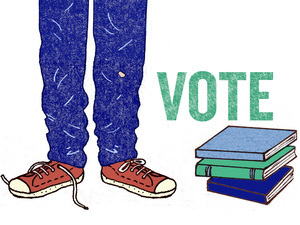
NPR is doing a list of people's favorite YA titles...and ACROSS THE UNIVERSE is a finalist! I don't want to get on everyone's nerves by begging for votes, but I do encourage everyone to go over to the list and vote--each person gets ten votes, so you can make your very own top ten list! And if you want to include ACROSS THE UNIVERSE it's right there on the top of the list (it's alphabetical) and I sure would appreciate a vote! <3
(PS: If you happen to have extra space on your top ten list and don't know what other book to vote for, I highly recommend THE BOOK THIEF by Markus Zusak. It's seriously amazing.)

Published on July 24, 2012 09:06
July 15, 2012
The Definition of Badass
So this past weekend, I was at Ascendio, the Harry Potter conference run by HPEF. Which was fantabulous. So much fun. Partly because Libba Bray is my new hero. Also because anything associated with Harry Potter = awesome.
One of the panels was Katniss, Bella, and Hermione: Finding the Balance Between Asskicking Prowess and Emotional Realism in the Girls of YA Fiction.
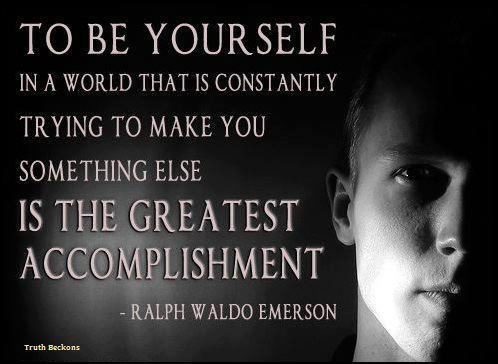
Which I am I very happy to say turned out to be more along the lines of Let's Talk About All the Awesome Ways Books Are Fighting the Good Fight for Feminism.
Keeping in mind, of course, that my definition of feminism is: women deserve equal rights and anyone who wants to take those rights away deserves to be kicked in the face.
So. The panel. It was epic. I was a tad bit afraid it would end up as people comparing characters to the point that one would be downplayed more than others, but our excellent moderator started us off on a positive note by pointing out that being a badass doesn't necessarily mean fighting--that there is a certain courage toward going after whatever it is you want, even if it's not something grand like winning a rebellion. There is strength in knowing that what you want is love, and going after that.
I ended up summing our panel conversation up thusly:
If you are someone who consciously decides what you want
and make the choice to go after it,
you are badass.
And honestly? This might be one of the most important things I've ever said. Another way of saying it is thought comparisons. Passiveness and apathy are the exact opposite of choices and actions.
When I was a teacher, that was the number one thing I tried to instill in my students: to determine what you want, and to go for it. I centered whole units around identifying and eradicating apathy--particularly through the works of Elie Wiesel, who is one of the greatest minds and most beautiful souls of our century, but it was the underlying message of every lesson I taught (I hope).
I blogged about this before--how the saddest thing I've ever seen was the student who had no dream. I think there's a valid argument to be made that apathy is one of the greatest evils of mankind.
Another great evil? Trying to take away someone else's choice. Choice comes in many different varieties--the girl who goes after romance is no less valid than the one who starts (or finishes) a war. It's silly to belittle a book character (or a person) for not wanting the same thing you do. You might think a person should choose a certain path, but it's not up to you. The heroine of a romance will want something different from the one who lives in a dystopian novel. But they're not wrong. Just different.
It's when someone else makes a decision that someone doesn't deserve the right to choose something, tries to take away a person's freedom, or try to counterattack an idea when things go wrong.
This sort of evil takes many different forms. At it's extreme, you see it in dystopian literature where the government won't give people the freedoms to choose their own lives. At a smaller--but just as evil--form, you have individuals who want to control others, take away rights, or make others inferior just because they can. These are the bullies of the world, and they exist every bit as much in real life as they do in books.
Which led me to continue my classy statement in summing up the panel thusly:
If you are someone who tries to take away
choices from someone else, then
you are a douche bag.
Those are words I can live by.
Also? That's basically the theme of all my books.


One of the panels was Katniss, Bella, and Hermione: Finding the Balance Between Asskicking Prowess and Emotional Realism in the Girls of YA Fiction.

Which I am I very happy to say turned out to be more along the lines of Let's Talk About All the Awesome Ways Books Are Fighting the Good Fight for Feminism.
Keeping in mind, of course, that my definition of feminism is: women deserve equal rights and anyone who wants to take those rights away deserves to be kicked in the face.
So. The panel. It was epic. I was a tad bit afraid it would end up as people comparing characters to the point that one would be downplayed more than others, but our excellent moderator started us off on a positive note by pointing out that being a badass doesn't necessarily mean fighting--that there is a certain courage toward going after whatever it is you want, even if it's not something grand like winning a rebellion. There is strength in knowing that what you want is love, and going after that.
I ended up summing our panel conversation up thusly:
If you are someone who consciously decides what you want
and make the choice to go after it,
you are badass.
And honestly? This might be one of the most important things I've ever said. Another way of saying it is thought comparisons. Passiveness and apathy are the exact opposite of choices and actions.
When I was a teacher, that was the number one thing I tried to instill in my students: to determine what you want, and to go for it. I centered whole units around identifying and eradicating apathy--particularly through the works of Elie Wiesel, who is one of the greatest minds and most beautiful souls of our century, but it was the underlying message of every lesson I taught (I hope).
I blogged about this before--how the saddest thing I've ever seen was the student who had no dream. I think there's a valid argument to be made that apathy is one of the greatest evils of mankind.
Another great evil? Trying to take away someone else's choice. Choice comes in many different varieties--the girl who goes after romance is no less valid than the one who starts (or finishes) a war. It's silly to belittle a book character (or a person) for not wanting the same thing you do. You might think a person should choose a certain path, but it's not up to you. The heroine of a romance will want something different from the one who lives in a dystopian novel. But they're not wrong. Just different.
It's when someone else makes a decision that someone doesn't deserve the right to choose something, tries to take away a person's freedom, or try to counterattack an idea when things go wrong.
This sort of evil takes many different forms. At it's extreme, you see it in dystopian literature where the government won't give people the freedoms to choose their own lives. At a smaller--but just as evil--form, you have individuals who want to control others, take away rights, or make others inferior just because they can. These are the bullies of the world, and they exist every bit as much in real life as they do in books.
Which led me to continue my classy statement in summing up the panel thusly:
If you are someone who tries to take away
choices from someone else, then
you are a douche bag.
Those are words I can live by.
Also? That's basically the theme of all my books.

Published on July 15, 2012 22:15
YA Scavenger Hunt Call For Authors!
Hi guys! As some of you know, I help out with the technical side (like website design) of the YA Scavenger Hunt, which was created by the awesome Colleen Houck. It's a triannual event where YA authors from all over basically do the most epic blog hop ever--with a grand-prize of a signed book from every author on the hunt. I'll be participating later this year, but for right now, I wanted to send a shout-out to all my author-friends:
Authors, you can sign up to participate in the YA Scavenger Hunt now! Authors can find out more information here, but here's some reasons why you should sign up:
Increased web traffic--at the last hunt, we had around 1,500 entrants for the grand prize, and authors saw about a 6,000 pageview increase on their websites during the hunt.
Meet new authors--part of the hunt is about swapping information with other authors, as each author hosts someone else
Meet new readers--more than 600 people voted in our poll last hunt that the #1 thing they looked forward to on the hunt was not the change to get a prize, but the chance to find new books to read.
Readers, you can invite your favorite authors to join! Just send them a tweet or an email with a link to the YA Scavenger Hunt page, and invite them to join.
The Hunt is really only as good as the people participating--both authors and readers. I know I sound a bit like a car salesman right now asking y'all to check it out, but the truth of the matter is that I think people will have a lot of fun with it. :)
A few important notes:
Space on the hunt is limited. Not every author who signs up will be able to get in--but that doesn't mean you shouldn't sign up. We're looking for fresh blood, that's what I'm saying :)
You need to sign up SOON! Like...NOW! Don't hesitate! :)


Authors, you can sign up to participate in the YA Scavenger Hunt now! Authors can find out more information here, but here's some reasons why you should sign up:
Increased web traffic--at the last hunt, we had around 1,500 entrants for the grand prize, and authors saw about a 6,000 pageview increase on their websites during the hunt.
Meet new authors--part of the hunt is about swapping information with other authors, as each author hosts someone else
Meet new readers--more than 600 people voted in our poll last hunt that the #1 thing they looked forward to on the hunt was not the change to get a prize, but the chance to find new books to read.
Readers, you can invite your favorite authors to join! Just send them a tweet or an email with a link to the YA Scavenger Hunt page, and invite them to join.
The Hunt is really only as good as the people participating--both authors and readers. I know I sound a bit like a car salesman right now asking y'all to check it out, but the truth of the matter is that I think people will have a lot of fun with it. :)
A few important notes:
Space on the hunt is limited. Not every author who signs up will be able to get in--but that doesn't mean you shouldn't sign up. We're looking for fresh blood, that's what I'm saying :)
You need to sign up SOON! Like...NOW! Don't hesitate! :)

Published on July 15, 2012 15:13
July 9, 2012
Guest Post: Meagan Spooner on Making Fantasy Real
Today it is my very great pleasure to welcome Meagan Spooner, author of the debut novel SKYLARK, to my blog! Meagan's a great author (and PS, doesn't SKYLARK have a pretty cover?!), and she's talking today about world building and fantasy. Make sure to read the whole post...and enter the giveaway at the end for a signed, first edition copy of SKYLARK!
Quick Links:
Website: http://www.meaganspooner.com
Twitter: http://twitter.com/MeaganSpooner
Facebook: http://www.facebook.com/SkylarkTrilogy
Goodreads: http://www.goodreads.com/book/show/10352973-skylark
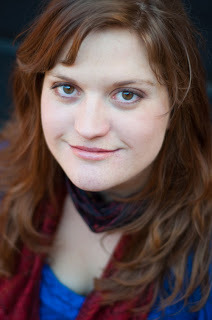
Bio:
Meagan Spooner grew up reading and writing every spare moment of the day, while dreaming about life as an archaeologist, a marine biologist, an astronaut. She graduated from Hamilton College in New York with a degree in playwriting, and has spent several years since then living in Australia. She's traveled with her family all over the world to places like Egypt, South Africa, the Arctic, Greece, Antarctica, and the Galapagos, and there's a bit of every trip in every story she writes.
She currently lives and writes in Northern Virginia, but the siren call of travel is hard to resist, and there's no telling how long she'll stay there.
In her spare time she plays guitar, plays video games, plays with her cat, and reads.
She is the author of SKYLARK, coming out August 1 from Carolrhoda Lab/Lerner Books. She is also the co-author of THESE BROKEN STARS, forthcoming from Disney-Hyperion in Fall 2013.
Synopsis:
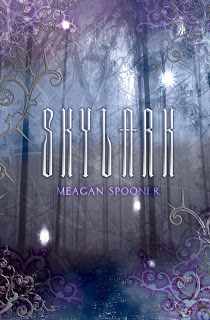
Vis in magia, in vita vi. In magic there is power, and in power, life.
For fifteen years, Lark Ainsley waited for the day when her Resource would be harvested and she would finally be an adult. After the harvest she expected a small role in the regular, orderly operation of the City within the Wall. She expected to do her part to maintain the refuge for the last survivors of the Wars. She expected to be a tiny cog in the larger clockwork of the city.
Lark did not expect to become the City's power supply.
For fifteen years, Lark Ainsley believed in a lie. Now she must escape the only world she's ever known...or face a fate more unimaginable than death.
Using Real-World Tools to Make Fantasy Feel Real
One of the things most people don’t know about SKYLARK when they read it is that it started out set in our own world, our own universe—it took place after the future scientific discovery of a new energy source referred to as magic. That ultimately didn’t stick, obviously. The book’s now set in an alternate universe in which magic was the dominant power source behind technology all along, because I wanted to simplify the straight-up fantasy aspects.
But ultimately, this original setting ended up benefitting the book tremendously. It was originally set in the remnants of what had once been Washington, D.C.—where I’ve lived almost my entire life. The forests Lark fled through were the forests I played in as a kid, in suburban Virginia. It gave my fantasy setting a real-world texture that I don’t think I would’ve had if I’d started writing originally set in this new, different world.
And now, even when I write stories set in fantasy worlds (or, as is the case with THESE BROKEN STARS, D*H-2013, other planets) I still start off by correlating them with real world places I’ve been to. Why, you ask? Keep reading, I say!

When you base your fantasy worlds on real-life places, you can use real-life tools to make them lifelike and fully-realized. Here’s a list of a few online tools you can use to make your invented worlds feel more real!
Google Maps (Or any map/GPS system that allows for walking routes!)
Boy, did I use the heck out of Google Maps while writing SKYLARK. Yeah, the maps are nice, but what I got the most mileage (hah) out of was their time estimates for walking routes. Lark spends much of her time on foot, walking (or running for her life) from place to place. I needed to know how long it would take to walk, for instance, from D.C. to the nearest point in the Appalachian mountain range. And then, how long would it take to walk through the mountains? And while I was researching this, I discovered a beautiful little waterfall tucked away there, and that made it into the story. The scenes that take place by the summer lake are some of my favorite in the entire book, and they never would’ve even happened if I hadn’t been tracing Lark’s route through an actual landscape.
Calorie Counters (I like Livestrong.com, but there are a lot of good ones!)
Of course, this one is really for anyone writing a survival story—any story, really, where your characters don’t have enough food. But one of the dangers Lark faces is starvation. When she crosses the Wall, she has absolutely no survival skills and very few supplies, and I had to know how much she’d need to eat per day just to be able to keep moving. I knew from my research Google Maps how many days she’d need to be in the wilderness, so I could find out just how much food she’d need with her to survive—and how much she’d need to find along the way.
Wikipedia
Um, hello? Doesn’t every author use Wikipedia these days? But see, here’s the thing. Because my setting was based on a real-world location, I could specifically look up lists of flora and fauna in the Virginia area—I could look up animal’s breeding seasons, their territorial habits, how easy they are to catch. I could look up plants, whether they’re edible, poisonous, itchy. Yes, some things are different in Lark’s world, but having access to info on an entire ecosystem on the web meant that I could keep everything in balance, make the wilderness Lark was trying to survive in feel like a real place. Because for her, one of the biggest and most constant threats to her safety is the wilderness itself, and if readers didn't buy the world, they weren't going to buy Lark's peril.
I’ve always been fond of books that have incredibly vivid settings—I like the setting of a book to almost feel like its own character. For example, I was never a big fan ofWuthering Heights (have I just committed sacrilege by saying that?) but the saving grace, for me, was the moors. They were so real and so wild and so atmospheric. And, of course, real—if not actually that creepy in real life. And while reading The Golden Compass, I wanted nothing more than to be a child at Jordan College myself—I almost felt like I could smell the dusty books. And while Lyra’s Jordan is in an alternate universe, it’s based on Oxford, a real place.
That’s not to say that every fully realized fantasy world comes from our world, but it’s definitely a fantastic place to start.
Thank you, Meagan, for sharing that awesome post with us! Now everyone, comment below by the end of the week to be entered to win a signed, first edition copy of SKYLARK! Sorry, but this is US only as the author is shipping it herself.
To share this post anywhere on the web, just click on the green button to the left.

Published on July 09, 2012 21:00
July 8, 2012
Ch-ch-ch-changes! Cover and summary reveal of SHADES OF EARTH!
I've just come back from a much-awaited family vacation to the wilds of thrilling Canada, and while I was gone, something big was announced, something that I know a lot of you have been waiting for! Last week, the cover was exclusively revealed by GeekDad at Wired.com (thanks GeekDad!)...along with another surprise...
All the books in the trilogy are getting a new look!
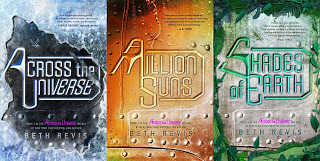
Click to embiggen!
Now, I know this has come as a shock to some of you. My first gut reaction when I saw the new covers was, "But they won't match the originals!" And that's true--but the more I look at them, the more I love them, and I hope you like them, too.
Some facts:
Penguin/Razorbill didn't change the covers lightly. We talked about the whole process, what was best for the books, and what the readers would like. That said, of course, we also knew...
We can't please everyone. There will be some people who don't like the new covers. There are a lot of people who didn't like the old ones, too. It would be absolutely impossible to please everyone, but I do believe that...
These covers capture the essence of each book. I really love that they are each stylized to look like the outside of the ship (rivets! Yay for rivets!). The ice is obviously symbolic to Amy for the first cover, and the leaves line up great with the third book, but my favorite is the second book. True fact: in the original book designs, they did several mock-ups for AMS. My favorite mock-up was a cover that was mostly orange, but no one else liked that one as much. So I'm secretly pretty thrilled that the second one is finally orange :)
The covers don't spoil the plot. This one was a huge issue for me, because I like my twisty plots! Every idea we had for the cover of Shades seemed to reveal a plot element that I wanted to keep hidden. This cover, though, seems to perfectly encapsulate the secrets of what is left for Amy and Elder to discover, and I truly appreciate that!
Changing covers, especially before the series ends, is always controversial, but I hope that you like the covers as much as I do! And if you'd like to read the summary of SHADES OF EARTH, you can do so here! (I didn't want to copy and paste it here since there are mild spoilers if you've not read the second book yet.)
Please feel free to leave your thoughts here, positive or negative. But remember: a book cover is like the gift wrap on a present--the real gift is the words inside. And speaking of that...I need to get back to editing those words for you! :)


All the books in the trilogy are getting a new look!

Click to embiggen!
Now, I know this has come as a shock to some of you. My first gut reaction when I saw the new covers was, "But they won't match the originals!" And that's true--but the more I look at them, the more I love them, and I hope you like them, too.
Some facts:
Penguin/Razorbill didn't change the covers lightly. We talked about the whole process, what was best for the books, and what the readers would like. That said, of course, we also knew...
We can't please everyone. There will be some people who don't like the new covers. There are a lot of people who didn't like the old ones, too. It would be absolutely impossible to please everyone, but I do believe that...
These covers capture the essence of each book. I really love that they are each stylized to look like the outside of the ship (rivets! Yay for rivets!). The ice is obviously symbolic to Amy for the first cover, and the leaves line up great with the third book, but my favorite is the second book. True fact: in the original book designs, they did several mock-ups for AMS. My favorite mock-up was a cover that was mostly orange, but no one else liked that one as much. So I'm secretly pretty thrilled that the second one is finally orange :)
The covers don't spoil the plot. This one was a huge issue for me, because I like my twisty plots! Every idea we had for the cover of Shades seemed to reveal a plot element that I wanted to keep hidden. This cover, though, seems to perfectly encapsulate the secrets of what is left for Amy and Elder to discover, and I truly appreciate that!
Changing covers, especially before the series ends, is always controversial, but I hope that you like the covers as much as I do! And if you'd like to read the summary of SHADES OF EARTH, you can do so here! (I didn't want to copy and paste it here since there are mild spoilers if you've not read the second book yet.)
Please feel free to leave your thoughts here, positive or negative. But remember: a book cover is like the gift wrap on a present--the real gift is the words inside. And speaking of that...I need to get back to editing those words for you! :)

Published on July 08, 2012 10:53
June 20, 2012
The Big Epic Post of Events in July!
Lots of things are happening next month! Which means I'm probably not going to post much. But! This means I might be coming to an area near you, and if I am, I hope I can come meet you!
So! Events!
ASCENDIO 2012
Orlando, FL
July 12-15, 2012
This Harry Potter fan conference is much more than just Harry Potter.
This year, they're doing a Quill Track, a series of workshops specifically for writers. I honestly believe that if you're a writer who can feasibly come to this conference, this is one to definitely attend. Totally worthwhile. The programming looks amazing.
MORE INFORMATION
REALM OF THE UNKNOWN
Irving, TX
July 19, 2012
Other authors in attendance:
-Andrea Cremer
-Marie Lu
-Jackson Pearce
-Rosemary Clement-Moore
2pm: Realm of the Unknown Party (open to teens only)
7pm: YA Author Panel and Signing
Irving, TX has a fantastic library system. You should absolutely check them out and see what cool things they are doing--not just on July 19 (I hope you come!) but also throughout the summer.
MORE INFORMATION
BOOK PEOPLE SIGNING
Austin, TX
July 21, 2012
Other authors in attendance:
-PJ Hoover
-KA Holt
Signing at the Book People bookstore is one of those nerdy book dreams I've held onto for awhile. My friend PJ Hoover has signed there before, and the pictures I've seen of her events make me want to run to the store and just explore. So I'm especially excited to sign there with her and KA Holt!
MORE INFORMATION
TEENS READ ART CONTEST
Online!
Opening July 21, 2012
This online contest is a great idea--a way for teens to celebrate any book through art (art of any kind--painting, photography, or more). Basically, a teen submits a digital photograph of a work of art, and could win $50 book gift card, signed books, and more! Be sure to check it out and encourage the teens in your life to celebrate art with art!
MORE INFORMATION
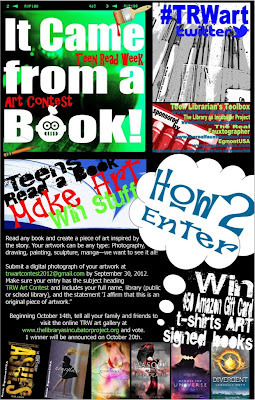


So! Events!
ASCENDIO 2012
Orlando, FL
July 12-15, 2012
This Harry Potter fan conference is much more than just Harry Potter.
This year, they're doing a Quill Track, a series of workshops specifically for writers. I honestly believe that if you're a writer who can feasibly come to this conference, this is one to definitely attend. Totally worthwhile. The programming looks amazing.
MORE INFORMATION
REALM OF THE UNKNOWN
Irving, TX
July 19, 2012
Other authors in attendance:
-Andrea Cremer
-Marie Lu
-Jackson Pearce
-Rosemary Clement-Moore
2pm: Realm of the Unknown Party (open to teens only)
7pm: YA Author Panel and Signing
Irving, TX has a fantastic library system. You should absolutely check them out and see what cool things they are doing--not just on July 19 (I hope you come!) but also throughout the summer.
MORE INFORMATION
BOOK PEOPLE SIGNING
Austin, TX
July 21, 2012
Other authors in attendance:
-PJ Hoover
-KA Holt
Signing at the Book People bookstore is one of those nerdy book dreams I've held onto for awhile. My friend PJ Hoover has signed there before, and the pictures I've seen of her events make me want to run to the store and just explore. So I'm especially excited to sign there with her and KA Holt!
MORE INFORMATION
TEENS READ ART CONTEST
Online!
Opening July 21, 2012
This online contest is a great idea--a way for teens to celebrate any book through art (art of any kind--painting, photography, or more). Basically, a teen submits a digital photograph of a work of art, and could win $50 book gift card, signed books, and more! Be sure to check it out and encourage the teens in your life to celebrate art with art!
MORE INFORMATION


Published on June 20, 2012 15:02
June 7, 2012
A Writing Experiment
It all started with this article by Rachel Aaron: "How I Went From Writing 2,000 Words a Day to Writing 10,000."
Or, I guess for me at least, it started with the rewrite for SHADES OF EARTH that I recently finished. To finish the rewrite on time, I had to commit to 6,000 words a day, every day, until it was due at the end of May. And in order to do the rewrite, I had to *gasp* outline.
But it wasn't really and outline--I had already completed a draft, after all--and it wasn't really a rewrite, because I was able to keep some scenes I'd already written, so while there was new material, it wasn't all new material, and while it required an outline, it was an outline based on the draft I already had.
So, when Holly Black started asking on Twitter if anyone had tried Aaron's method of increasing word count, I was eager to jump on board and try my hand at it, too.
I'm working on a new book currently. I won't tell you what it is except to point you to this clue. But the point is, it's a completely new, from-scratch idea that I'm building from the ground up. Not a sequel (so the characters are not yet established), not a rewrite (so the story's not already established).
The point of Aaron's article can be summed up like this: plan what you're going to write first, then you can write it easier. This is definitely true for me. When I was teaching, I had a 40 minute drive (each way) to get to work. I spent that time thinking about my stories--so when I sat down to write when I got home, I already knew what I was going to write. It wasn't much detail, but it was there.
Since I quit teaching, I realized that I spend a lot more time on my butt, staring at the screen, and not actually, you know, writing. I've been a bit disappointed in myself that now that writing is my full time job, I'm not writing that much more than I had when working.
I still don't truly believe in outlines--not very detailed ones at least--but I'm going to show you what I've done this past week that left me with a complete proposal and the start of a new book. In all fairness, I have been working on the proposal for awhile now, so that part wasn't new--but the actual text in the story is!
STEP ONE: ORGANIZATION
This story is going to be a fantasy, so I had to think a lot about world-building and how the magic system worked. This is the stuff I mostly did a while ago, while I was brainstorming. I have a big art pad, where I've doodled a map of the world I'm building, listed out characters and how they relate to each other, and created the rules of the magic system.
STEP TWO: OUTLINING/PROPOSAL
If in the first step I was to gather together all of the ingredients to the story, this is the step where I started mixing them together to create a tasty, tasty story. This is also the point where the random brainstorming had to start fitting into the shape of a story.
Now, here's the key thing for me. I hate outlines. But as Rachel points out in her article, it's not so much about a single outline, but about knowing what you want to write beforehand.
For me, another important issue was knowing where in the novel I wanted things to happen. I have a pretty complicated plot with a lot of characters, so I new I wanted Character R, for example, introduced before the first third of the novel was over, and I knew I wanted Clue A in the first quarter of the book, then at least a few chapters spaced out before I introduced Clue B.
This is the sort of stuff I usually thought about after I finished writing, and then it usually came about as Oops! Of course I need to put this here before this, now I have to go back and change it and cut this and move that and then drink a lot of vodka because holy shizz, this is going to take a lot of work.
So, to do this, I turned to Scrivener.
I used the corkboard feature, something I've never really bothered with before. I basically made a different notecard for each key part of the story that I knew needed to happen. It was very basic--two different cards were about introducing two different characters that are not at the first chapter of the book, there was no more than one sentence description of some key events. I ended up with about 15 index cards.
Once I had that, I worked on re-arranging everything, so that the character were introduced a few chapters apart. I looked at the clues I had, and spaced them out, adding in new cards for red herrings. I noticed that the main character had a bunch of high moments--I kicked her down and added a low moment (and vice versa). This brought my card count up to over 30.
STEP THREE: WRITING
Now I had 30-ish index cards with a brief note of what needed to go into each chapter. From there, I needed to just...write.
What I've been doing--and what's worked very well so far--is that I'll write the chapter I'm working on, then scan ahead a few index cards to see what needs to be done next. This will job my memory--it's sort of like scouting ahead on a road map before starting the car. Then I go through and add more details to the next card after the chapter I just finished. This means when I start on the next chapter the next day, I have a pretty specific idea of what needs to happen.
RESULTS
I've only been using this method a few days. But in those few days, here's what I have:
A complete proposal. I went from notes and brainstorming to a complete idea of what I want the book to be, in terms of tone, action, everything.
A limited outline. I don't like working with highly detailed outlines. I have no more than a sentence for about 30 chapters, and the full knowledge that I'll probably deviate from this.
A road map of where to go. While I don't plan on rigidly sticking to my outline, I do have an idea that within a certain percentage of the book, certain things need to happen. I'm more aware of the direction I need to take the story to be able to hit the highlights.
Specifics for a few chapters ahead. This helps me to sit down and immediately start writing, as opposed to sitting down and staring at the computer screen.
10k words. True--I had about half of that already in a rough form. But now I've got a polish 10k that has a lot of the layers and details that I'll often not get to until the final draft.
Will I be able to keep up the pace? I don't know. I'd like to shoot for a steady 3-4k words per day, about double what I typically do (2k/day). But mostly, what I want to cut out is the idle time where I just sit and stare at the screen, or goof off and go online, or make excuses.
What about you? Do you have any methods you use to write more efficiently?
To share this post anywhere on the web, just click on the green button to the left.

Or, I guess for me at least, it started with the rewrite for SHADES OF EARTH that I recently finished. To finish the rewrite on time, I had to commit to 6,000 words a day, every day, until it was due at the end of May. And in order to do the rewrite, I had to *gasp* outline.
But it wasn't really and outline--I had already completed a draft, after all--and it wasn't really a rewrite, because I was able to keep some scenes I'd already written, so while there was new material, it wasn't all new material, and while it required an outline, it was an outline based on the draft I already had.
So, when Holly Black started asking on Twitter if anyone had tried Aaron's method of increasing word count, I was eager to jump on board and try my hand at it, too.
I'm working on a new book currently. I won't tell you what it is except to point you to this clue. But the point is, it's a completely new, from-scratch idea that I'm building from the ground up. Not a sequel (so the characters are not yet established), not a rewrite (so the story's not already established).
The point of Aaron's article can be summed up like this: plan what you're going to write first, then you can write it easier. This is definitely true for me. When I was teaching, I had a 40 minute drive (each way) to get to work. I spent that time thinking about my stories--so when I sat down to write when I got home, I already knew what I was going to write. It wasn't much detail, but it was there.
Since I quit teaching, I realized that I spend a lot more time on my butt, staring at the screen, and not actually, you know, writing. I've been a bit disappointed in myself that now that writing is my full time job, I'm not writing that much more than I had when working.
I still don't truly believe in outlines--not very detailed ones at least--but I'm going to show you what I've done this past week that left me with a complete proposal and the start of a new book. In all fairness, I have been working on the proposal for awhile now, so that part wasn't new--but the actual text in the story is!
STEP ONE: ORGANIZATION
This story is going to be a fantasy, so I had to think a lot about world-building and how the magic system worked. This is the stuff I mostly did a while ago, while I was brainstorming. I have a big art pad, where I've doodled a map of the world I'm building, listed out characters and how they relate to each other, and created the rules of the magic system.
STEP TWO: OUTLINING/PROPOSAL
If in the first step I was to gather together all of the ingredients to the story, this is the step where I started mixing them together to create a tasty, tasty story. This is also the point where the random brainstorming had to start fitting into the shape of a story.
Now, here's the key thing for me. I hate outlines. But as Rachel points out in her article, it's not so much about a single outline, but about knowing what you want to write beforehand.
For me, another important issue was knowing where in the novel I wanted things to happen. I have a pretty complicated plot with a lot of characters, so I new I wanted Character R, for example, introduced before the first third of the novel was over, and I knew I wanted Clue A in the first quarter of the book, then at least a few chapters spaced out before I introduced Clue B.
This is the sort of stuff I usually thought about after I finished writing, and then it usually came about as Oops! Of course I need to put this here before this, now I have to go back and change it and cut this and move that and then drink a lot of vodka because holy shizz, this is going to take a lot of work.
So, to do this, I turned to Scrivener.
I used the corkboard feature, something I've never really bothered with before. I basically made a different notecard for each key part of the story that I knew needed to happen. It was very basic--two different cards were about introducing two different characters that are not at the first chapter of the book, there was no more than one sentence description of some key events. I ended up with about 15 index cards.
Once I had that, I worked on re-arranging everything, so that the character were introduced a few chapters apart. I looked at the clues I had, and spaced them out, adding in new cards for red herrings. I noticed that the main character had a bunch of high moments--I kicked her down and added a low moment (and vice versa). This brought my card count up to over 30.
STEP THREE: WRITING
Now I had 30-ish index cards with a brief note of what needed to go into each chapter. From there, I needed to just...write.
What I've been doing--and what's worked very well so far--is that I'll write the chapter I'm working on, then scan ahead a few index cards to see what needs to be done next. This will job my memory--it's sort of like scouting ahead on a road map before starting the car. Then I go through and add more details to the next card after the chapter I just finished. This means when I start on the next chapter the next day, I have a pretty specific idea of what needs to happen.
RESULTS
I've only been using this method a few days. But in those few days, here's what I have:
A complete proposal. I went from notes and brainstorming to a complete idea of what I want the book to be, in terms of tone, action, everything.
A limited outline. I don't like working with highly detailed outlines. I have no more than a sentence for about 30 chapters, and the full knowledge that I'll probably deviate from this.
A road map of where to go. While I don't plan on rigidly sticking to my outline, I do have an idea that within a certain percentage of the book, certain things need to happen. I'm more aware of the direction I need to take the story to be able to hit the highlights.
Specifics for a few chapters ahead. This helps me to sit down and immediately start writing, as opposed to sitting down and staring at the computer screen.
10k words. True--I had about half of that already in a rough form. But now I've got a polish 10k that has a lot of the layers and details that I'll often not get to until the final draft.
Will I be able to keep up the pace? I don't know. I'd like to shoot for a steady 3-4k words per day, about double what I typically do (2k/day). But mostly, what I want to cut out is the idle time where I just sit and stare at the screen, or goof off and go online, or make excuses.
What about you? Do you have any methods you use to write more efficiently?
To share this post anywhere on the web, just click on the green button to the left.

Published on June 07, 2012 19:43
June 6, 2012
Destination Elsewhere
Have I mentioned lately how much I love Penguin? Because I love them like whoa.
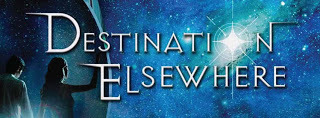
Not too long ago, they launched a program called "Destination Elsewhere." It was a ning community where people could talk about all the cool sci fi and fantasy books, movies, and TV. Recently, Destination Elsewhere has moved to Facebook, and they're really focused on creating a strong community full of awesome discussions. Look at their credo:
Awesome, right?
And you might have noticed that the cover photo for Destination Elsewhere has Amy and Elder on it. When I saw that, I thought: this would be an awesome time to give away another book.
This is just a quick, simple giveaway. Like Destination Elsewhere on Facebook (you can do this without even leaving this page through the Rafflecopter widget below), let me know about it on the widget, and you're entered. The prize is either a hardback copy of A MILLION SUNS or, if you prefer, a paperback of ACROSS THE UNIVERSE. Open internationally, giveaway ends June 13th.
a Rafflecopter giveaway
To share this post anywhere on the web, just click on the green button to the left.


Not too long ago, they launched a program called "Destination Elsewhere." It was a ning community where people could talk about all the cool sci fi and fantasy books, movies, and TV. Recently, Destination Elsewhere has moved to Facebook, and they're really focused on creating a strong community full of awesome discussions. Look at their credo:
Destination Elsewhere is an online community dedicated to talking about the best in Science Fiction and Fantasy, from books to film to TV, from any creator or publisher, past or present (or future). Come one, come all.
Awesome, right?
And you might have noticed that the cover photo for Destination Elsewhere has Amy and Elder on it. When I saw that, I thought: this would be an awesome time to give away another book.
This is just a quick, simple giveaway. Like Destination Elsewhere on Facebook (you can do this without even leaving this page through the Rafflecopter widget below), let me know about it on the widget, and you're entered. The prize is either a hardback copy of A MILLION SUNS or, if you prefer, a paperback of ACROSS THE UNIVERSE. Open internationally, giveaway ends June 13th.
a Rafflecopter giveaway
To share this post anywhere on the web, just click on the green button to the left.

Published on June 06, 2012 21:00
Ray Bradbury & His Gift of Hope
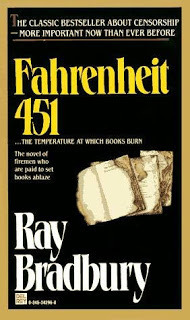
I think it was Ray Bradbury's book, Fahrenheit 451, that taught me that the world isn't fair.
I was in high school when I read it, I believe. For a class. I can't remember which class or even what grade I was in, but I remember reading it at one of those hard-seated student desks my high school used. And, later, discussing it with the class.
I remember being so angry that the characters in this book lived in a world that just wasn't fair. It wasn't right that they were censored and controlled by the government. It wasn't fair.
And yet--despite living in a world that was supremely unjust--some of the characters fought back.
This was hugely influential to me and my attitude about stories and writing. My mother is a big believer in happily ever after, but I've found that the stories I like best are the ones like Fahrenheit 451--the world isn't fair, and the characters can't truly escape it...but they fight anyway.
Much later--only a few years ago, actually--someone mentioned that their favorite short story was "All Summer in a Day" by Ray Bradbury. At the time, I'd never heard of that story before, so I quickly went online, found a copy, and read.
"All Summer in a Day" has many of the same themes of an unjust world as Fahrenheit 451--in it, a group of children live in a colony on Venus, a planet where, due to clouds and rain, you can only see the sun once a year. This story is about hope--and how easily it can be crushed and taken away. I won't ruin the story for you--it's short, and you can easily find it online. Read it.
"All Summer in a Day" and Fahrenheit 451 are very dark. They are sad. They do not end happily ever after. In particular, "All Summer in a Day" speaks of cruelty--even at the hands of our peers--and the ceaseless darkness in any person's heart, even the heart of a child.
And yet despite all this--Ray Bradbury's works give me hope.
I've said before how to me, dystopians are not depressing books. They're books of hope. They're books that say even when things are at their darkest, there is still a glimmer of light.
[image error]
Ray Bradbury was the first person to teach me that.
This is an incredibly important lesson for anyone to learn. I am grateful that Bradbury's works helped me to see early on that even when the world isn't fair--and it never is, no matter what our childish hearts might want--it is still worth saving.
When I read about Ray Bradbury's passing this morning, that was the thought I was left with: here is a great man, who has left the world a brighter place than it once was. Thank you.
To share this post anywhere on the web, just click on the green button to the left.

Published on June 06, 2012 08:53



